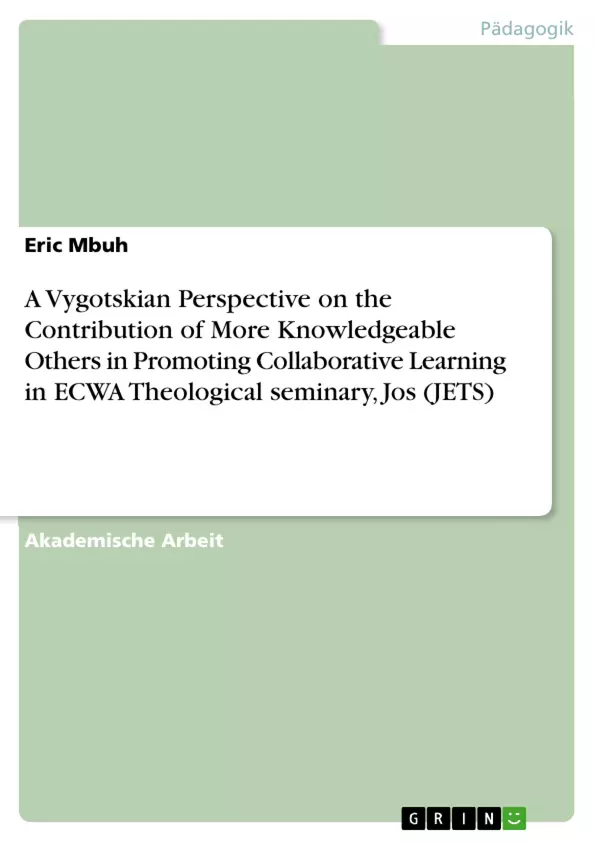The objective of this study is to investigate the possibility of transformation that arises from using a Vygotskian framework to understand the role of More Knowledgeable Others (MKOs) in promoting learning at ECWA Theological Seminary, Jos (JETS). This study examines the impact of social interaction and scaffolding on the educational process at JETS, drawing on Vygotsky's sociocultural theory. It highlights the significance of More Knowledgeable Others (MKOs), such as instructors and peers, in molding students' cognitive development and academic progress. The results emphasize the interactive and cooperative nature of the learning environment at JETS, which is consistent with Vygotsky's theoretical framework. By engaging in interactive encounters with others who possess different levels of expertise, students are effectively guided towards their zone of proximal development (ZPD). This process facilitates the gradual internalization of knowledge and abilities. This study highlights the need for deliberate curriculum design and instructional approaches that include More Knowledgeable Others (MKOs) in the educational experience. At JETS, the use of mentorship programs, peer teaching, and interactive classroom activities, which are based on Vygotskian principles, has been found to significantly improve educational outcomes. The Vygotskian perspective highlights the significant influence of More Knowledgeable Others (MKOs) in facilitating learning at ECWA Theological Seminary, Jos. By acknowledging and utilizing the capabilities of those with more expertise and knowledge, JETS can persistently foster a dynamic and intellectually engaging educational setting that fosters the cognitive and spiritual development of its students.
Inhaltsverzeichnis
- Abstract
- I. INTRODUCTION
- II. LITERATURE REVIEW
- a. The Zone of Proximal Development
- b. Collaborative Learning in Academia
- c. Collaborative Learning with Teachers
- d. Implications of Collaborative learning for Student-to-student, student to lecturer, and the academic community.
- Student-to-Student Implications
- Student-to-Lecturer Implications
- Academic Community Implications
- III. FINDINGS OF THE STUDY
- IV. RECURRING THEMES FROM THE INTERVIEW
- V. INTERPRETATION AND DISCUSSION
- Die Rolle von „More Knowledgeable Others“ (MKOs) in der Förderung kollaborativen Lernens
- Die Auswirkungen sozialer Interaktion und Scaffolding auf den Bildungsprozess
- Die Anwendung des Vygotskianischen Rahmens auf die theologische Bildungsumgebung
- Die Bedeutung von „More Knowledgeable Others“ (MKOs) in der Gestaltung der kognitiven Entwicklung der Studierenden
- Die Untersuchung der konkreten Methoden zur Umsetzung des Konzepts von „More Knowledgeable Others“ (MKOs) in theologischen Bildungseinrichtungen
- I. INTRODUCTION: Das Kapitel führt in die Thematik des kollaborativen Lernens ein und stellt die soziokulturelle Theorie von Lev Vygotsky vor. Die Bedeutung der sozialen Interaktion und die Rolle von „More Knowledgeable Others“ (MKOs) in der kognitiven Entwicklung werden hervorgehoben. Der Schwerpunkt liegt auf der Kritik an traditionellen pädagogischen Ansätzen und der Betonung der Sprache als wichtiges Werkzeug für die Interaktion mit der Welt.
- II. LITERATURE REVIEW: Dieses Kapitel erörtert die relevanten Konzepte, die für die Studie essenziell sind, darunter die Zone der proximalen Entwicklung (ZPD) und die „More Knowledgeable Others“ (MKOs). Es werden verschiedene Perspektiven auf kollaboratives Lernen in der akademischen Welt beleuchtet und die Auswirkungen von kollaborativem Lernen für verschiedene Akteure im Bildungsprozess diskutiert.
- III. FINDINGS OF THE STUDY: Dieses Kapitel präsentiert die Ergebnisse der Forschungsarbeit. Es konzentriert sich auf die Analyse der Daten, die durch Interviews und Beobachtungen am ECWA Theological Seminary, Jos (JETS) gewonnen wurden.
- IV. RECURRING THEMES FROM THE INTERVIEW: Dieses Kapitel analysiert wiederkehrende Themen aus den Interviews mit den Teilnehmern der Studie. Es konzentriert sich auf die Erfahrungen der Studierenden und der Dozenten im Kontext des kollaborativen Lernens am JETS.
Zielsetzung und Themenschwerpunkte
Diese Studie zielt darauf ab, die Möglichkeiten der Transformation zu untersuchen, die sich aus der Anwendung eines Vygotskianischen Rahmens ergeben, um die Rolle von „More Knowledgeable Others“ (MKOs) bei der Förderung des Lernens am ECWA Theological Seminary, Jos (JETS) zu verstehen. Die Studie untersucht die Auswirkungen sozialer Interaktion und Scaffolding auf den Bildungsprozess am JETS, wobei sie sich auf Vygotskys soziokulturelle Theorie stützt. Sie hebt die Bedeutung von „More Knowledgeable Others“ (MKOs) wie Dozenten und Kommilitonen bei der Gestaltung der kognitiven Entwicklung und des akademischen Fortschritts der Studierenden hervor.
Zusammenfassung der Kapitel
Schlüsselwörter
Die Studie konzentriert sich auf Vygotskys soziokulturelle Theorie, die Rolle von „More Knowledgeable Others“ (MKOs) in der Förderung des kollaborativen Lernens, die Auswirkungen von sozialer Interaktion und Scaffolding auf den Bildungsprozess und die Anwendung des Vygotskianischen Rahmens in der theologischen Bildungsumgebung.
- Quote paper
- Eric Mbuh (Author), 2024, A Vygotskian Perspective on the Contribution of More Knowledgeable Others in Promoting Collaborative Learning in ECWA Theological seminary, Jos (JETS), Munich, GRIN Verlag, https://www.hausarbeiten.de/document/1496840


